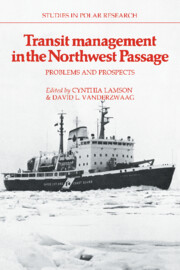Book contents
- Frontmatter
- Contents
- List of figures
- Acknowledgments
- PART I PERSPECTIVES ON THE PROBLEM
- 1 The Northwest Passage: a contrast of visions
- Post scriptum
- 2 The environment of the Northwest Passage
- 3 The development of Northern ocean industries
- 4 Arctic marine transport and ancillary technologies
- 5 Canadian arctic marine transportation: present status and future requirements
- 6 Northern decision making: a drifting net in a restless sea
- 7 Constitutional development in the Northwest Territories
- PART II PARADIGMS AND PROSPECTS
- APPENDIX: Statement on Canadian sovereignty
- CONTRIBUTORS
3 - The development of Northern ocean industries
Published online by Cambridge University Press: 26 March 2010
- Frontmatter
- Contents
- List of figures
- Acknowledgments
- PART I PERSPECTIVES ON THE PROBLEM
- 1 The Northwest Passage: a contrast of visions
- Post scriptum
- 2 The environment of the Northwest Passage
- 3 The development of Northern ocean industries
- 4 Arctic marine transport and ancillary technologies
- 5 Canadian arctic marine transportation: present status and future requirements
- 6 Northern decision making: a drifting net in a restless sea
- 7 Constitutional development in the Northwest Territories
- PART II PARADIGMS AND PROSPECTS
- APPENDIX: Statement on Canadian sovereignty
- CONTRIBUTORS
Summary
The problem outlined
Northern economic development, whether based on land or sea resources, has been problematic because serious developmental conflicts have not been resolved to the satisfaction of the North's principal interest groups. While corporate pressures promote non-renewable resource development, utilizing high technology and skilled or semi-skilled labour from the South, other groups advocate an entirely different development scenario, preferring development based on the exploitation of renewable resources by the indigenous population utilizing low technology. Government, having the responsibility for developing the North for the benefit of all Canadians, often finds itself in the role of an unwilling arbitrator between industry (large corporations), native peoples, and environmental protection groups. Northern development will, therefore, require making various choices both in terms of alternatives for development, and in resolving and reconciling conflicts between numerous interest groups.
The problems of Northern development are particularly acute in the ocean areas. Canada's Northern marine areas are especially rich in oil and gas resources. Exploration activities are taking place, or are proposed, for the Mackenzie Delta–Beaufort Sea, the High Arctic Islands, Lancaster Sound, and Baffin Bay–Davis Strait; that is, virtually all across the North. The Arctic as a marine region has the largest potential for recoverable oil and gas resources in Canada, but their commercial exploitation requires favourable demand and price conditions, and accelerated development of support technologies such as drill ships and artificial islands. Mineral development is also taking place in the Arctic Archipelago; in the early 1970s a lead-zinc mine began production in Strathcona Sound and, in 1982 Cominco's Polaris Mine began exploitation of the lead-zinc deposits on Little Cornwallis Island.
- Type
- Chapter
- Information
- Transit Management in the Northwest PassageProblems and Prospects, pp. 65 - 99Publisher: Cambridge University PressPrint publication year: 1988



